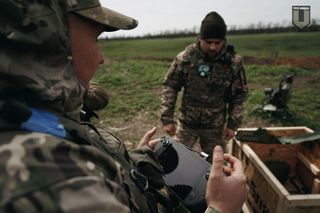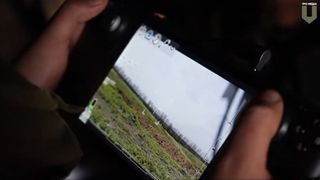Ukraine's army is experimenting with using Steam Decks to remote-control gun turrets
A video showcases Valve's hit handheld being used in a very unexpected way.
The Steam Deck is a remarkably powerful piece of hardware, capable of doing all sorts of interesting things. But the Ukrainian military appears to have found one use that I'm pretty sure wasn't anticipated in any of Valve's design meetings: As a controller for a remote gun turret.
Photos of the Steam Deck purportedly being used to control a gun turret first turned up in mid-April, shared by TRO Media, but they looked a little suspect: There was nothing to indicate that the Steam Deck in question was being used as part of the weapon, and not just for a spot of Vampire Survivors during a reload.

More recently, though, video from what appears to be the same event has turned up, and a Steam Deck is clearly being used to control the turret.
The purpose of a remotely-controlled turret is obvious: Get a gun on the front line without exposing the people using it to enemy fire. The auto-translated closed captioning in this separate YouTube video (which also shows the Steam Deck in use as a turret controller, but doesn't have as clear an angle on it) makes that point explicitly: "It removes a person from the line of fire, makes it possible to provide [fire] support without being a priority target and causing enemy fire on ourselves." But why use a Steam Deck for such a thing?
It actually makes a lot of sense, according to Bellingcat researcher Aric Toler, who helped uncover the leak of classified military documents on Discord in April.
"Steam Deck is pretty perfect when you think about it," Toler told PC Gamer. "Totally native OS client, great controller you can use, touch screen, etc.
"It makes perfect sense for Steam Deck to be used, assuming the software is Linux-compatible (unless they went through the godawful process of dual-booting Windows on a Steam Deck)."
The biggest gaming news, reviews and hardware deals
Keep up to date with the most important stories and the best deals, as picked by the PC Gamer team.
There's a practical upside to using Steam Decks in this application too. $399 for a base model Steam Deck isn't cheap, but Toler said that control modules on systems like this can be "insanely expensive," and are also subject to export controls, meaning they can be difficult for officially non-aligned nations to acquire. Steam Deck availability, on the other hand, all comes down to Valve's manufacturing capacity, and because it's an all-in-one solution rather than a controller plugged into a separate, discrete system, there are fewer headaches involved all around.
From the video embedded up top, here's a look at the turret control UI on the Steam Deck:

The turrets, called Shablya—Ukrainian for "saber"—were actually developed some years ago by Ukrainian company Global Dynamics. They're equipped with thermal imaging and a range finder, and can handle a number of different weapons including machine guns and grenade launchers. In 2015, a crowdfunding campaign run through the Ukrainian military and civil crowdfunding site People's Project raised ₴445,000 ($12,000) to fund and maintain 10 Shablya turrets for the Ukrainian military.
According to Ukrainian website Vikna.tv, a batch of Shablya turrets was recently deployed with Ukraine's 68th Jaeger Brigade. The unit recently posted its own video of the turret in use on Facebook.
Ironically, none of the Ukrainian sites that hosted or shared the images made any mention of the presence of a Steam Deck—instead, it was people who saw the videos and recognized the device that brought it to wider attention. Toler speculated that the Ukrainian forces "probably just thought it was a standard control set" and so didn't make a fuss about it.
Andy has been gaming on PCs from the very beginning, starting as a youngster with text adventures and primitive action games on a cassette-based TRS80. From there he graduated to the glory days of Sierra Online adventures and Microprose sims, ran a local BBS, learned how to build PCs, and developed a longstanding love of RPGs, immersive sims, and shooters. He began writing videogame news in 2007 for The Escapist and somehow managed to avoid getting fired until 2014, when he joined the storied ranks of PC Gamer. He covers all aspects of the industry, from new game announcements and patch notes to legal disputes, Twitch beefs, esports, and Henry Cavill. Lots of Henry Cavill.
Most Popular






